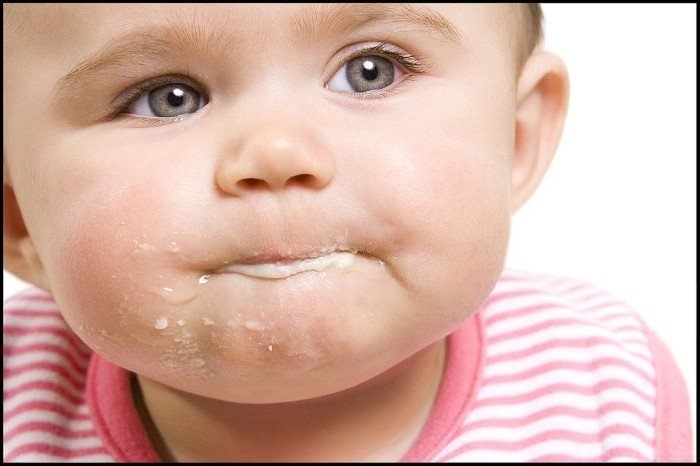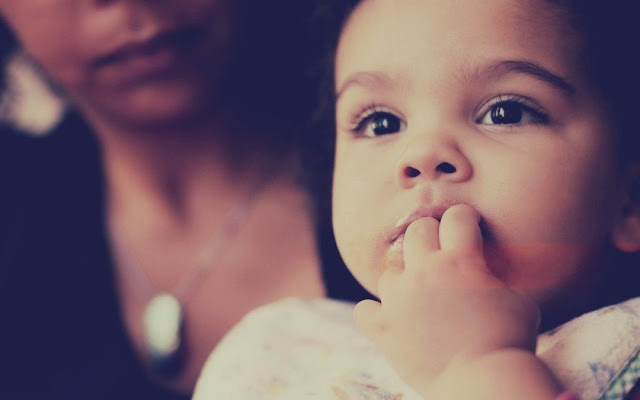Some parents report teething causing vomiting for their growing babies.
While it is typical for babies to experience pain or discomfort that leads to lots of drooling, biting, and chewing;
vomiting, diarrhea, and fever are not teething symptoms.
If your baby has started actively teething with the regularly associated teething symptoms and is also suffering from vomiting,
98% of the time the symptoms are unrelated.
In most cases, the vomiting is caused by an illness such as a virus, not teething.
When Teething DOES Cause Vomiting In Infants
Pay close attention to the symptoms and signs often associated with teething. Among a long list of things, you might see swollen gums and excessive drooling. The excessive drooling may be one explanation if your teething baby is vomiting or getting a rash. When saliva production is increased during teething, the majority of it is swallowed, while the rest soaks your baby, your shoulder, and your furniture. Because saliva contains digestive enzymes that help break down food, swallowing too much saliva may cause an upset stomach that results in vomiting in some babies.Another possible explanation for vomiting during teething is the presence of bacteria or a virus. Teething causes discomfort and babies and toddlers alike tend to try to ease the pain by gnawing on stuff. Random objects not intended for mouthing and even their own hands may be teeming with bacteria that cause illness, vomiting, and diarrhea. Look for other symptoms of a viral infection, such as a fever or extreme loss of appetite. While some sources online link teething and vomiting, it is best to consult a medical professional if you notice your child vomiting for over 24 hours.

AAP Study Dismisses Fever, Vomiting & Diarrhea As Teething Symptoms
The Journal of the American Academy of Pediatrics conducted a study that asked parents of 125 teething babies to record the presence or absence of 18 different symptoms twice per day for each tooth eruption.The study listed the teething period per tooth as 4 days before a tooth erupted through the gums and 3 days after the tooth appeared. Check out the baby teething chart to learn about baby teeth order. This study helped resolve the question of can teething cause vomiting in toddlers and infants.
The results showed that 35% of teething infants had no symptoms during the eight-day teething period as defined by the study. The remainder of the parents reported typical teething signs and symptoms such as drooling, rash on face, decreased appetite for solid foods, irritability, abnormal temperature, sucking, wakefulness, gum rubbing, biting, and ear rubbing.
In this study, a fever during teething was not common; however, some infants did have a slight increase in temperature (less than 102 degrees), but only prior to and on the day of the tooth actually erupting.
Diarrhea and teething also had a weak relationship.
Vomiting was not a teething symptom that parents reported back at all, which further supports the theory that teething does not cause vomiting.
The doctors involved in the study used the opportunity to remind parents that abnormal “supposed symptoms” of teething include fever over 102 degrees, vomiting, diarrhea, decreased urine, cough, runny nose or any other symptoms that cause babies to act really sick or not like themselves. If these symptoms appear in your child, they should be evaluated by a doctor and not simply written off as a mysterious teething symptom.
Preventing Upset Stomach and Vomiting During Teething
An upset stomach or vomiting could be a sign that your little one is swallowing too much saliva, or that they are swallowing a large amount of air during crying. If your doctor rules out more severe illness, he or she may recommend a natural or over-the-counter product to help alleviate pain and help your child settle and stop drooling and crying so much.Most other typical teething symptoms last a few days before and after the tooth eruption, so be sure to pay close attention to your baby so that you know what symptoms are considered “normal” for them and knowing how to soothe a teething baby. Often, the discomfort and irritability associated with teething can be easily managed at home with natural teething remedies such as natural teething gel, teething toys, silicone teething necklace, and Baltic Amber teething necklace. Just make sure to keep several clean teething toys and necklaces in a rotation to prevent bacteria.
Kute Keiki offers teething solutions that are hygienic, hypoallergenic, and resistant to bacteria. Super easy to clean with just soap and water, these food grade silicone teething toys go into the refrigerator and attach to car seats and strollers for instant relief for your baby on the go.
Published from the Blog of Kute Keiki
Original Post -- https://www.kutekeiki.com/teething/can-teething-cause-vomiting/

